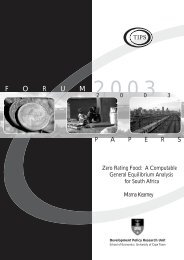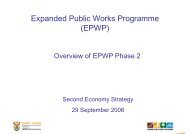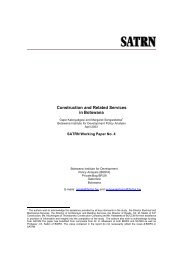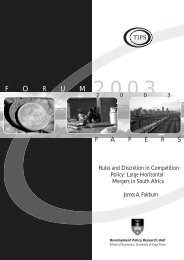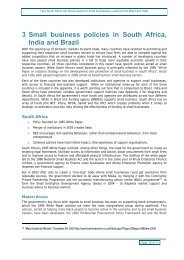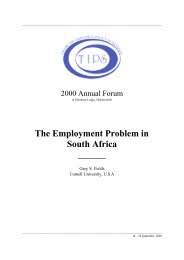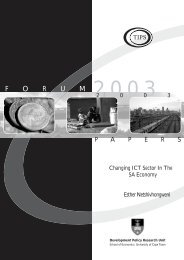Monitor Vol 39 08_Final_Nov08.pdf - tips
Monitor Vol 39 08_Final_Nov08.pdf - tips
Monitor Vol 39 08_Final_Nov08.pdf - tips
Create successful ePaper yourself
Turn your PDF publications into a flip-book with our unique Google optimized e-Paper software.
environmental<br />
policy<br />
53<br />
Commercialisation<br />
of biofuel industry<br />
in Africa:<br />
Trade & Industry <strong>Monitor</strong><br />
A review*<br />
B y B a m i k o l e A m i g u n , R o va n i S i g a m o n e y a n d<br />
Harro von Blottnitz †<br />
1. Introduction<br />
Energy plays a critical role in the development process, first as a domestic necessity<br />
but also as a factor of production whose cost directly affects price of other<br />
goods and services 1 . It affects all aspects of development—social, economic, and environmental—including<br />
livelihoods, access to water, agricultural productivity, health,<br />
population levels, education, and gender-related issues. Access to energy has been described as a<br />
key factor in industrial development and in providing vital services that improve the quality of life,<br />
the engine of economic progress 2 .<br />
Ensuring the provision of adequate, affordable, efficient and reliable high-quality energy services<br />
with minimum adverse effect on the environment for a sustained period is not only pivotal for<br />
development, but crucial for African countries in which most are struggling to meet present energy<br />
demands. Further, the continent needs such energy services to be in the position to improve its<br />
* This paper was first published in Renewable and Sustainable Energy Reviews 12 (20<strong>08</strong>). The authors are grateful to Dr. Desta<br />
Mebratu, the regional DTIE officer, United Nations Environment Programme (UNEP) regional office, Kenya for his inputs.<br />
† Environmental and Process Systems Engineering Research Group, Department of Chemical Engineering, University of Cape<br />
Town. The authors are grateful to Dr. Desta Mebratu, the regional DTIE officer, United Nations Environment Programme<br />
(UNEP) regional office, Kenya for his inputs.<br />
Diversification of energy sources, agricultural<br />
activities and a higher percentage of locally<br />
produced energy are goals that can be satisfied<br />
by biofuels. Biofuels such as biogas, biodiesel, and<br />
bioethanol may be easier to commercialise than<br />
other alternative fuels, considering performance,<br />
infrastructure and other factors. Lack of a good<br />
understanding and application of key concepts of<br />
cost estimation—a key to successful project which<br />
impacts both the project profitability and influences<br />
the technical solutions—is a foremost barrier to its<br />
commercialisation in Africa, despite the availability<br />
of biomass resources. A plethora of other generic<br />
technological and non-technological constrictions<br />
has been identified to also hinder biofuels adoption<br />
and development. Understanding the economics<br />
of the biofuel industry is, therefore, crucial in<br />
realising eventual commercialisation. This article<br />
provides knowledge-based review for expansion<br />
(commercialisation) of biomass-derived fuel (biofuel)<br />
through improved understanding of its economics in<br />
Africa. In addition, recommendations to overcome<br />
the technological and non-technological hurdles to<br />
market penetration of biofuels are discussed.



